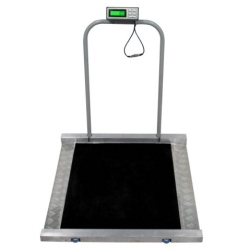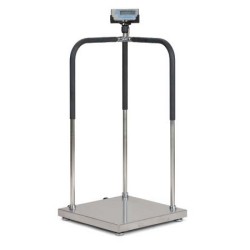As the Baby Boomer generation ages, the healthcare system is facing unprecedented challenges in meeting the needs of this large and diverse population. With advancements in medical science and improved standards of living, Baby Boomers are living longer than previous generations. However, this prolonged lifespan comes with a unique set of medical challenges that require a comprehensive and empathetic approach from healthcare providers.
One crucial aspect of elderly care is accurately weighing patients, which can be particularly challenging when dealing with individuals who have mobility issues or require assistance. In this article, we will explore some of the medical challenges that Baby Boomers face as they age and the significance of specialized patient weighing scales in providing the best possible care.

-
Mobility Limitations and Wheelchair Access
As Baby Boomers age, many may encounter mobility limitations that affect their ability to walk or stand. Conditions such as arthritis, osteoporosis, or neurological disorders can significantly impact an individual’s mobility. For patients who are wheelchair-bound or have difficulty walking, traditional standing scales may not be appropriate or practical for weighing. In such cases, healthcare facilities need to invest in wheelchair-accessible scales that ensure accurate and safe measurements.
Wheelchair-accessible scales are designed to accommodate a patient’s wheelchair, allowing them to remain seated while being weighed. These scales are equipped with ramps or built-in platforms that can accommodate wheelchairs of various sizes, providing a comfortable and dignified weighing experience for patients with mobility challenges.
-
Maintaining Balance and Stability
Even for Baby Boomers who can walk, maintaining balance and stability can be a challenge. As people age, they may experience a decline in muscle strength and coordination, making it difficult for them to stand unassisted on traditional scales. In such cases, using a handrail or support can be necessary to ensure patient safety during the weighing process.
Healthcare facilities can install scales with handrails to provide additional support to patients while they stand on the scale. These handrails offer a stable grip, reducing the risk of falls or accidents during weighing. Additionally, healthcare professionals can assist patients in maintaining their balance while getting accurate weight measurements, ensuring the safety and comfort of elderly individuals during the process.
-
Impact of Obesity on Weighing
Obesity is a prevalent health issue among aging Baby Boomers, leading to a range of medical complications such as diabetes, cardiovascular disease, and joint problems. Traditional scales may not always be suitable for weighing obese patients, as they have weight limitations and may not provide accurate readings for heavier individuals.
Bariatric scales are specifically designed to accommodate patients with obesity. These scales have higher weight capacities and wider platforms, providing accurate measurements for heavier individuals. By investing in bariatric scales, healthcare facilities can ensure that all patients receive precise and dignified weighing, regardless of their body size.
-
Accuracy in Medication Dosages
Accurate patient weighing is not only essential for monitoring health conditions but also plays a crucial role in determining appropriate medication dosages. As Baby Boomers age, they may require multiple medications to manage various health conditions. The effectiveness and safety of these medications rely on precise dosing, which, in turn, depends on accurate patient weight measurements.
Using specialized patient weighing scales ensures that healthcare professionals obtain accurate weight data, leading to appropriate medication adjustments based on the patient’s individual needs. This personalized approach to medication management is crucial in preventing adverse drug reactions and optimizing treatment outcomes.
-
The Role of Technology in Patient Weighing:
Advancements in technology have revolutionized healthcare, and patient weighing scales are no exception. Modern scales come equipped with digital displays and electronic interfaces, making it easier for healthcare professionals to read and record weight measurements accurately. Additionally, some scales are now integrated with electronic medical record (EMR) systems, enabling seamless data transfer and reducing the risk of transcription errors.
Moreover, some scales offer wireless connectivity, allowing healthcare providers to monitor patients’ weight trends over time remotely. This feature is particularly useful for home care or long-term care settings, where regular weight monitoring is critical for tracking changes in health conditions.

Final Thoughts:
As Baby Boomers age and require medical care, healthcare providers must address the unique challenges they face with empathy and specialized solutions. Accurate patient weighing is an essential aspect of elderly care, allowing healthcare professionals to monitor health conditions, determine appropriate treatments, and prevent potential complications. The use of wheel chair scales, handrail-equipped scales, and bariatric scales ensures that patients with mobility limitations or obesity receive accurate and dignified weighing experiences. Another point to consider is providing patients with affordable medical grade scales to weigh themselves at home. With more telehealth visits being done than ever before, patients still need an accurate and reliable method of weighing.
Additionally, embracing technology in patient weighing scales facilitates data accuracy, seamless record-keeping, and remote monitoring, enhancing the overall quality of care provided to elderly patients. By prioritizing accurate and compassionate patient weighing, healthcare facilities can contribute to better health outcomes and improved well-being for the aging Baby Boomer population.